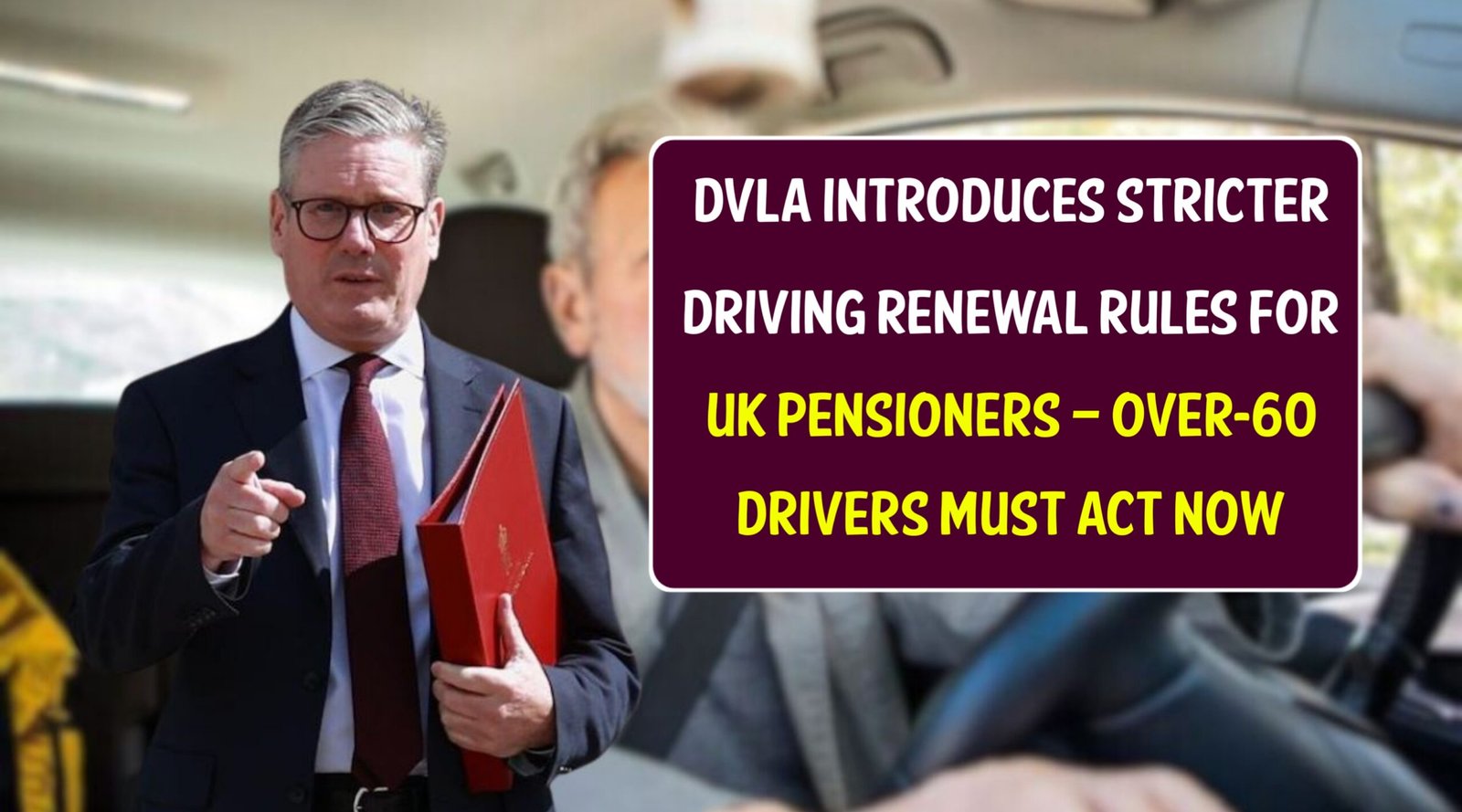The UK’s Driver and Vehicle Licensing Agency (DVLA) has recently announced significant changes to driving licence renewal rules for pensioners. These new regulations are set to affect all drivers over the age of 60, introducing stricter checks and requirements to ensure road safety. While the changes are aimed at reducing accidents and enhancing public safety, they may also create new challenges for older drivers. Understanding these changes and acting promptly is essential to avoid penalties and maintain legal driving status.
New Age-Based Renewal Requirements
Under the updated DVLA rules, drivers aged 60 and above will face more stringent renewal procedures. Previously, drivers over 70 were required to renew their licences every three years, often with minimal medical checks. Now, the new regulations extend certain medical assessments to drivers as young as 60, depending on their health conditions.
The primary goal of these changes is to ensure that older drivers maintain the physical and cognitive ability to drive safely. The DVLA will now request updated medical reports for those with conditions such as vision impairment, heart problems, diabetes, or neurological disorders. Failure to submit accurate medical documentation may result in licence suspension or fines.
Digital Renewal Process and Deadlines
The DVLA has also emphasized digitalisation in the renewal process. Drivers are encouraged to renew their licences online, which offers faster processing times and instant confirmation. Paper applications are still accepted but may experience delays due to increased verification checks.
Renewal deadlines are strictly enforced. Over-60 drivers must submit their renewal applications well before the expiry date of their licence. Late submissions could lead to driving fines or, in extreme cases, disqualification from driving until the licence is renewed.
Increased Penalties for Non-Compliance
With stricter rules, the penalties for non-compliance have also risen. The DVLA has introduced fines of up to £1,000 for failing to renew on time or providing incomplete medical information. Moreover, driving without a valid licence can result in prosecution, points on your licence, or insurance complications.
Older drivers are advised to keep track of their renewal dates and maintain accurate medical records. Regular eye and health tests are recommended to ensure there are no last-minute surprises during the application process.
Medical Assessments Explained
The DVLA requires certain medical checks to assess fitness to drive. These assessments may include:
- Vision tests: Ensuring drivers meet minimum eyesight standards.
- Blood pressure and heart function tests: For those with cardiovascular conditions.
- Neurological evaluations: For conditions like dementia, Parkinson’s, or stroke recovery.
- Diabetes management reports: To ensure safe blood sugar levels for driving.
It is essential for pensioners to obtain these medical reports from their general practitioners and submit them alongside the renewal application. Incorrect or missing documentation can delay renewal and impact the legal right to drive.
Impact on Insurance Policies
Insurance providers are closely monitoring the DVLA changes. Older drivers who fail to renew licences on time or do not meet medical requirements may face increased premiums or policy cancellations. Insurance companies consider driving ability and legal compliance when calculating rates, so timely renewal is crucial for avoiding unnecessary financial burdens.
Drivers are encouraged to notify their insurers immediately about any medical conditions or licence status changes to prevent coverage issues. This proactive approach will help maintain both legal compliance and continuous insurance protection.
Guidance for Caregivers and Family Members
Family members and caregivers of over-60 drivers play a crucial role in ensuring compliance with the new rules. They should assist elderly drivers in:
- Keeping track of renewal dates.
- Scheduling and attending medical assessments.
- Understanding the online renewal process.
- Maintaining accurate health records for submission.
Support from family can reduce stress and ensure older drivers remain legally compliant while maintaining independence on the road.
Advice for Healthy Older Drivers
Even pensioners in excellent health must comply with the new DVLA regulations. Early preparation can prevent last-minute complications and delays. Key advice includes:
- Renew licences at least six weeks before expiry.
- Complete all required medical assessments well in advance.
- Double-check personal information and documents before submission.
- Keep digital copies of all submitted documents for future reference.
By following these steps, drivers can continue driving safely and legally without disruption.
Potential Challenges and Criticisms
While these changes aim to improve road safety, some older drivers have expressed concerns. The primary challenges include:
- Increased stress due to medical assessments.
- Delays in licence processing.
- Higher administrative burden for pensioners.
- Potential financial costs for repeated medical tests.
Critics argue that the regulations may unfairly target older drivers who are healthy and capable, creating unnecessary bureaucratic obstacles. The DVLA, however, maintains that these rules are necessary to protect all road users.
Preparing for the Future
The DVLA changes highlight a broader focus on road safety for all age groups. Over-60 drivers should:
- Schedule regular health checks.
- Stay informed about any updates to driving regulations.
- Plan licence renewals in advance to avoid last-minute issues.
- Maintain a driving log to monitor any health-related challenges.
Planning ahead can ensure a smooth renewal process and continued legal driving privileges.
Conclusion
The DVLA’s stricter driving renewal rules for pensioners are a significant shift in UK road safety policy. Over-60 drivers must act promptly to comply with the new requirements, including submitting medical assessments and renewing licences on time. Failure to do so can result in fines, licence suspension, and insurance complications.
While these changes may introduce new challenges, they ultimately aim to enhance safety for both older drivers and the general public. Family support, careful planning, and adherence to medical requirements are crucial steps to ensure compliance. By staying informed and proactive, pensioners can continue to enjoy the independence of driving while meeting the DVLA’s safety standards.
With careful preparation and awareness, older drivers can navigate the new regulations smoothly, ensuring a safe and legal driving experience for years to come.
